Heartless Friends Force Redditor's Emotional Support Dog To Sleep Outside Then Vote Them Out Of The Trip After Having Night Terrors
Complex PTSD can be diagnosed in adults or children who have undergone repeated traumatic events such as violence, abuse, or neglect. Losing trust and feeling separated from others is one of the effects that adults with complex PTSD experience.
Complex PTSD symptoms are similar to PTSD and sometimes include difficulty controlling emotions, feelings of shame or guilt, dissociation, headaches, dizziness, chest pains, stomach aches, as well as suicidal thoughts. People with complex PTSD may require more therapy sessions than usual since they often find it difficult to trust others and need time to build a trusting relationship with their therapist.
People with PTSD struggle with nightmares and night terrors that lead to nighttime awakenings, making it difficult to fall back asleep. The contents of their dreams are vivid, sometimes repetitive, and usually related to past trauma.
Some service dogs are trained to recognize when an individual is experiencing sleep disturbances. They are trained to identify signals and disrupt active behavioral patterns.
A Redditor who goes by the username u/aita-bnbdog made a post on the r/AmItheA**hole subReddit where they explained how their friends voted them out of a trip because they brought along their emotional support dog. OP explained how the emotional support dog helps them sleep since they have CPTSD and night terrors. Scroll down and check out the full Reddit post.
Here's the original Reddit post by u/aita-bnbdog:
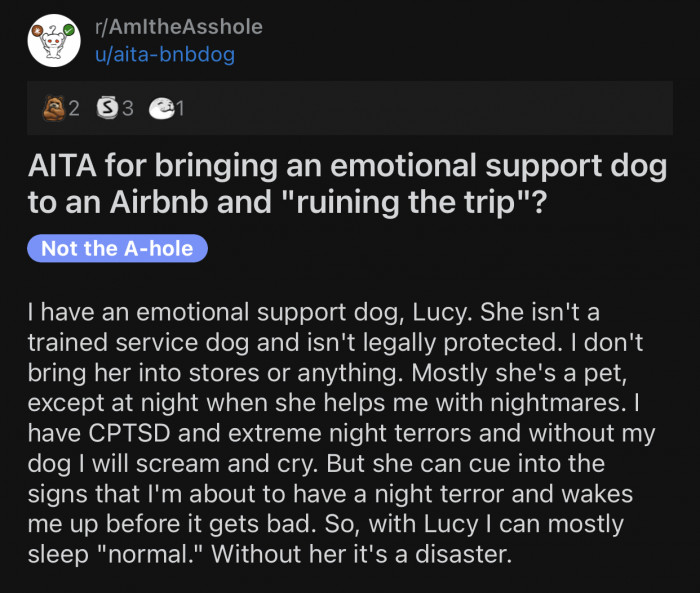
At first, everything was going according to plan, and everyone was happy.

Then Lucy stepped into the picture, and everything went sideways.
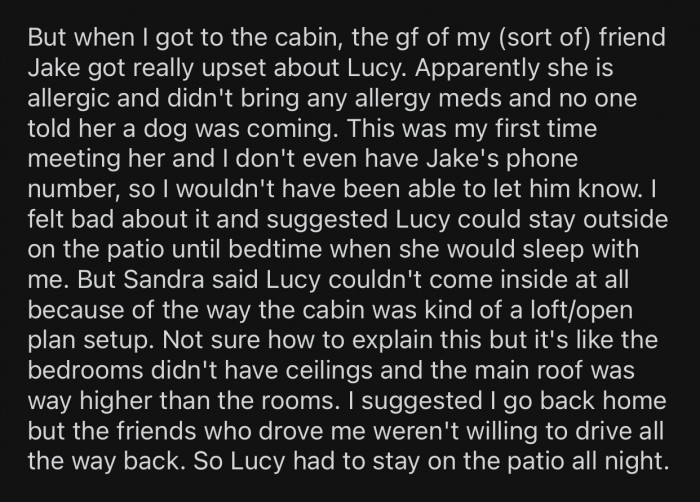
The social dynamics observed in this scenario can be understood through the lens of group psychology. Dr. Ramani Durvasula, a clinical psychologist, states, "Social exclusion can have profound emotional consequences, particularly for those who have experienced trauma." Individuals with complex PTSD are especially vulnerable to such behaviors, as their past traumas may amplify feelings of worthlessness and abandonment when faced with rejection. This highlights the importance of fostering supportive environments, particularly for individuals dealing with trauma, as they can be significantly impacted by perceived social threats. To better understand the psychological mechanisms behind social exclusion, implementing group discussions focused on emotional awareness can improve understanding among friends, fostering an environment where individuals feel valued and included, as noted by Dr. Durvasula on her website drramani.com.
As expected, what OP knew was going to happen ended up occurring.
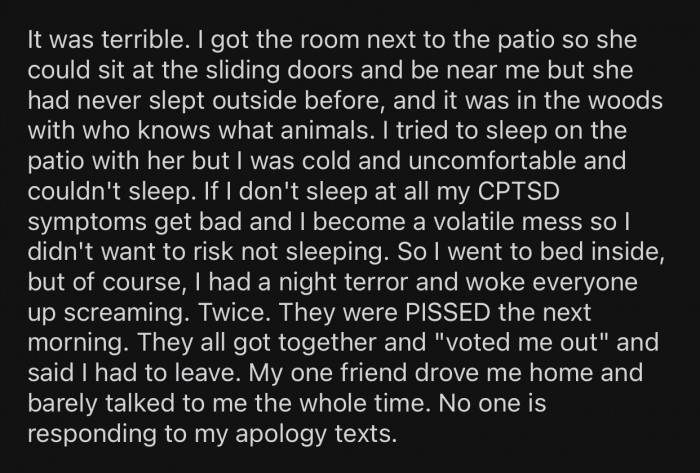
OP is unsure whether they are in the wrong for bringing the dog on the trip without consulting their friends first.

OP then added two EDITS to clarify matters further.
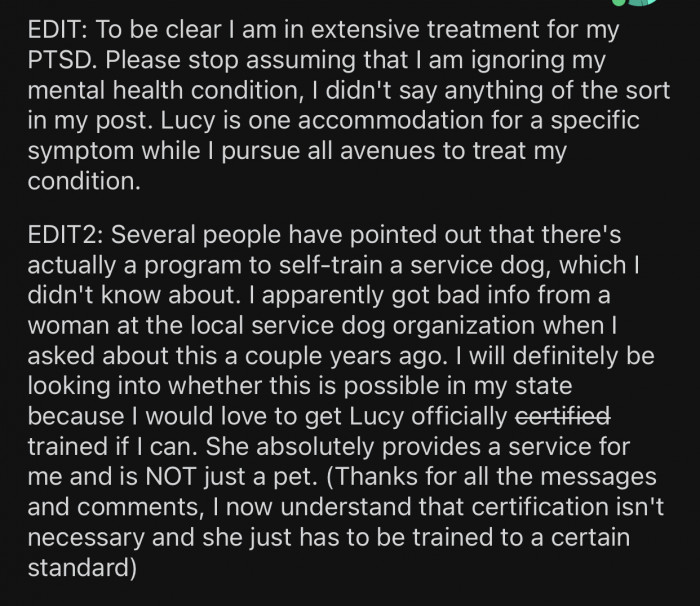
Understanding PTSD and Complex PTSD
Complex PTSD, unlike standard PTSD, often stems from prolonged or repeated trauma, such as emotional abuse or neglect, resulting in a range of emotional dysregulations and interpersonal issues. According to a study published in the National Institutes of Health, individuals with complex PTSD may struggle with trust and emotional regulation, making them more susceptible to negative relational dynamics. The symptoms can include heightened anxiety, feelings of hopelessness, and difficulty in forming secure attachments. This can create a vicious cycle, where the individual’s past trauma leads them to seek out unhealthy relationships, perpetuating their feelings of isolation and distress.
Understanding these dynamics is essential for friends and family members to provide the necessary support, as they may need to approach their loved ones with increased patience and empathy.
Soon after, OP added a final EDIT where they detailed their answers:
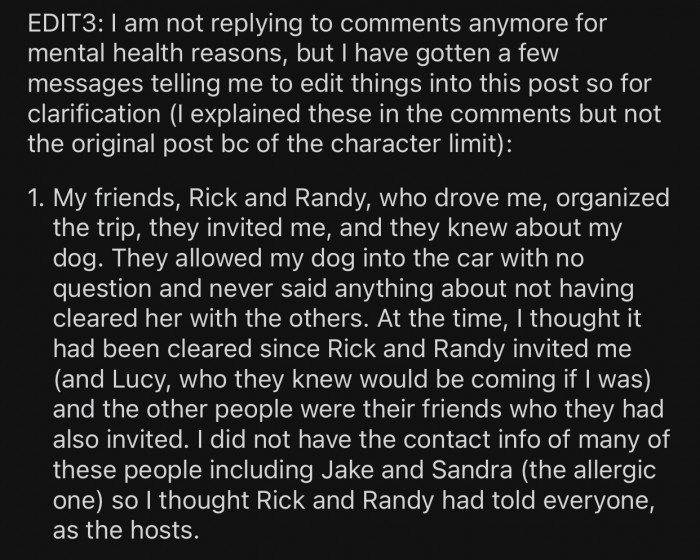
OP tried to find a solution to the allergy problem, but their friends were not cooperating.
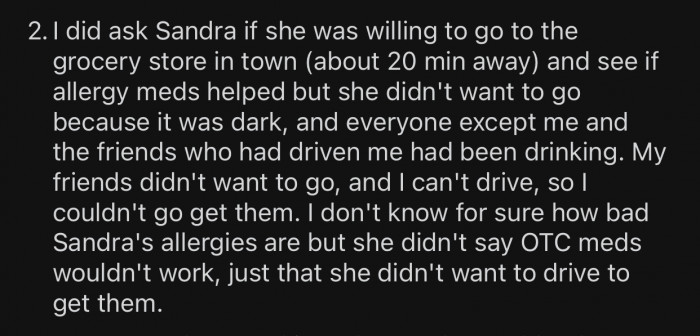
They simply wanted OP out of the trip.
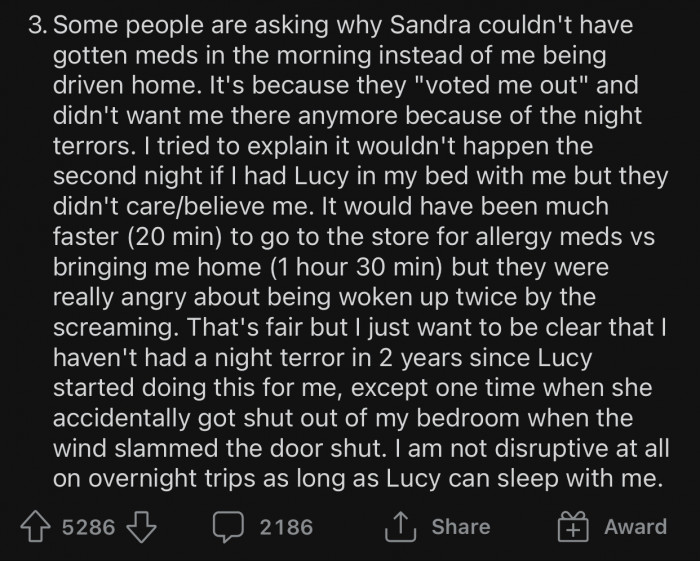
A behavioral psychologist emphasizes that the treatment of complex PTSD often requires more than just individual therapy; it necessitates a systemic approach involving the individual's social environment. Studies show that the people surrounding someone with complex PTSD can significantly influence their recovery process. For instance, a supportive friend group can encourage positive coping mechanisms and provide emotional reinforcement, whereas a toxic environment can exacerbate symptoms and hinder progress.
To cultivate a healing environment, it's crucial for friends to engage in educational initiatives about trauma and its effects. Workshops or group therapy sessions could be beneficial in developing a better understanding of complex PTSD and how to support affected individuals.
Here's how the Reddit community reacted to u/aita-bnbdog's dilemma:

Sandra should have taken the necessary precautions.
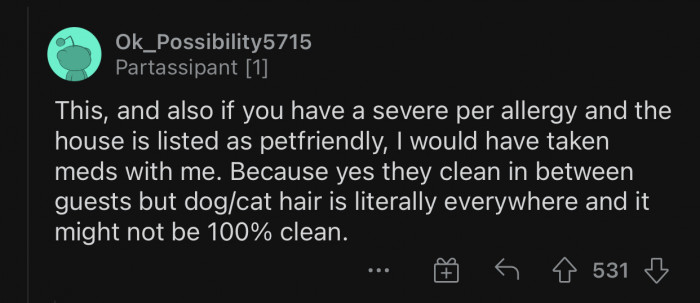
If your friends mistreat you, you will probably be better off without them.

The Role of Empathy in Relationships
Empathy plays a pivotal role in interpersonal relationships, particularly for individuals dealing with trauma. Research indicates that empathy can act as a buffer against the negative effects of social exclusion and can significantly improve the quality of relationships for those suffering from PTSD. According to Dr. Terri Orbuch, a relationship researcher and author, "Empathy allows individuals to feel understood and supported, which is crucial for healing." This creates a safe space where individuals can share their vulnerabilities without fear of ostracization. Encouraging empathy can be as simple as initiating conversations about feelings and experiences within the group, fostering a culture of openness and acceptance. As noted by Dr. John Gottman, a renowned marriage researcher, "When we create an environment of empathy, we strengthen emotional connections and resilience among friends."
Her "friends" are well aware of the importance Lucy has in OP's life.

All of the people involved in this situation suck, except for OP, of course.
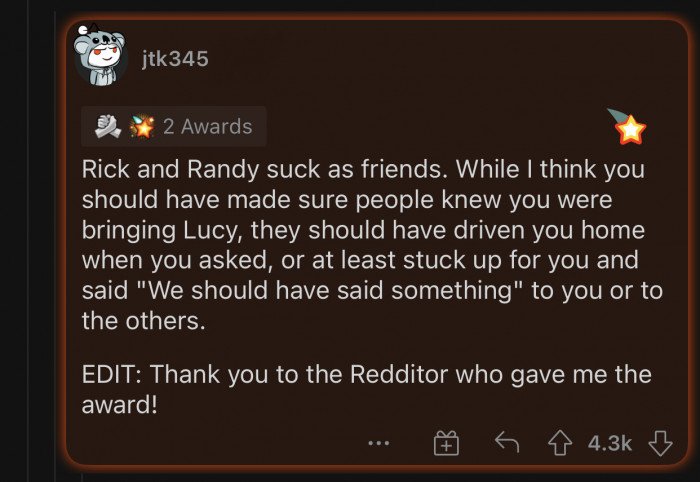
OP's friends should have been concerned after they had night terrors, not weirded out or angry.
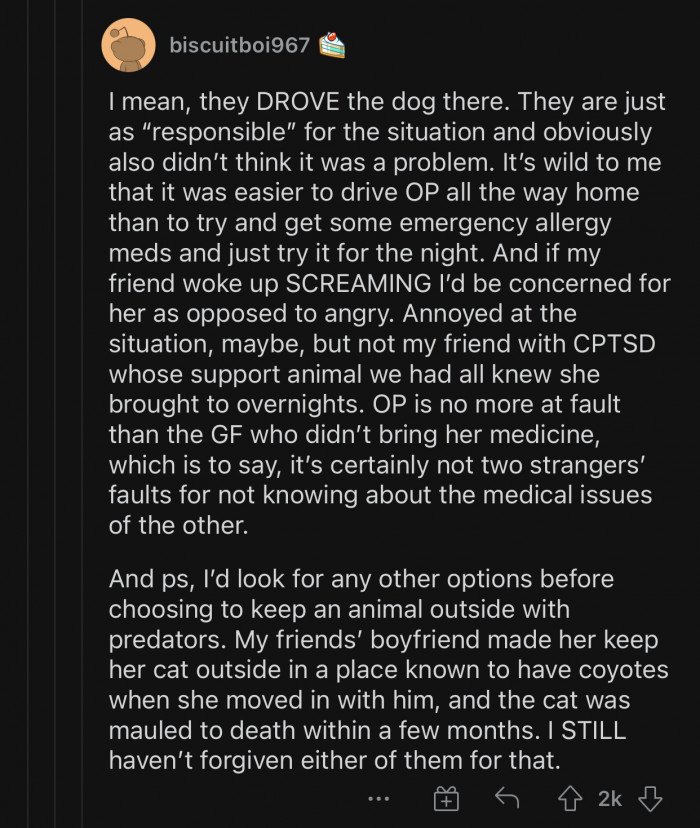
Group dynamics can often mirror the patterns seen in family systems, where certain members may take on roles that perpetuate dysfunction. As Dr. Alexandra Solomon, a relationship therapist, notes, "When one member of a group exhibits signs of distress, it can trigger a ripple effect, influencing the entire group's behavior and potentially leading to exclusion or scapegoating." Addressing these patterns through systemic interventions that foster healthy communication and mutual respect is crucial. Implementing such interventions could involve structured group activities that focus on collective problem-solving, allowing friends to work through their emotions together and enhancing their relational skills.
OP needs to find new friends.
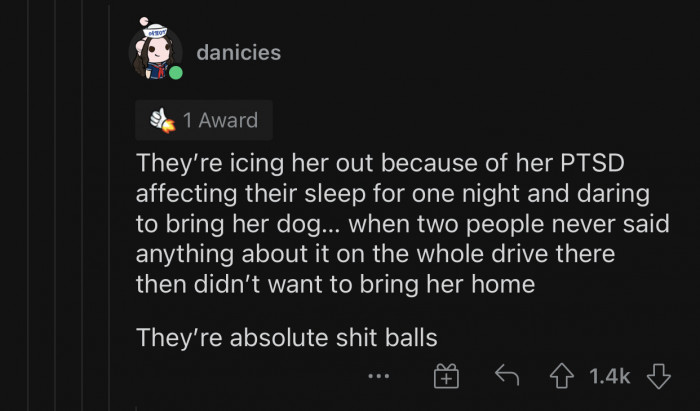
OP deserves better than these heartless, cruel friends.
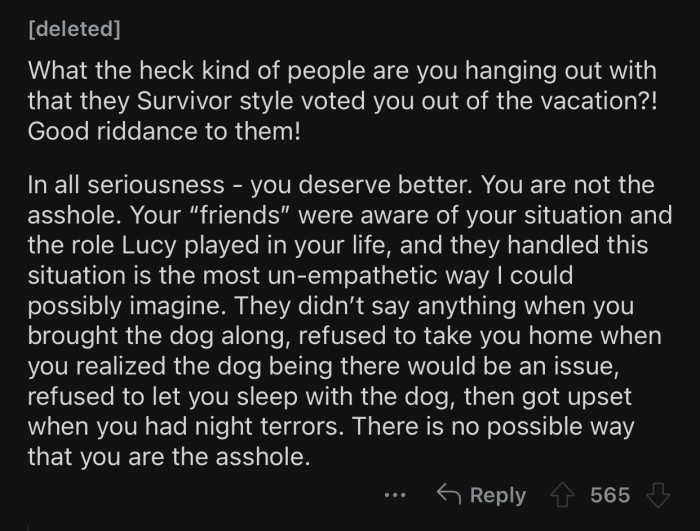
Any decent human being would have done the same.

Practical Solutions for Supportive Friendships
To create a more supportive environment for friends dealing with complex PTSD, practical steps can be taken. Trauma specialists often recommend establishing clear communication channels where feelings can be expressed without fear of judgment. Regular check-ins, where friends can share their emotional states and needs, can provide a foundation for mutual understanding and support.
Additionally, engaging in activities that strengthen the group's bond—such as team-building exercises or shared creative projects—can foster resilience and togetherness. According to research from the National Institutes of Health, these shared experiences can help mitigate feelings of isolation and enhance group cohesion, creating a healthier social environment.
They are not good friends, and OP should cut them off.
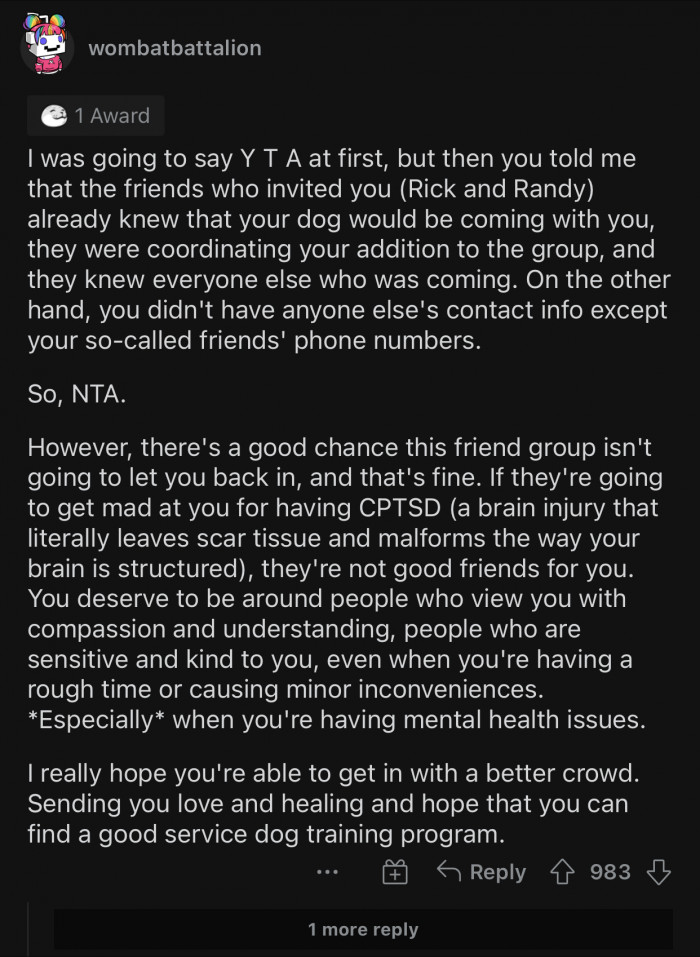
OP replied to another comment to provide more context about the situation.
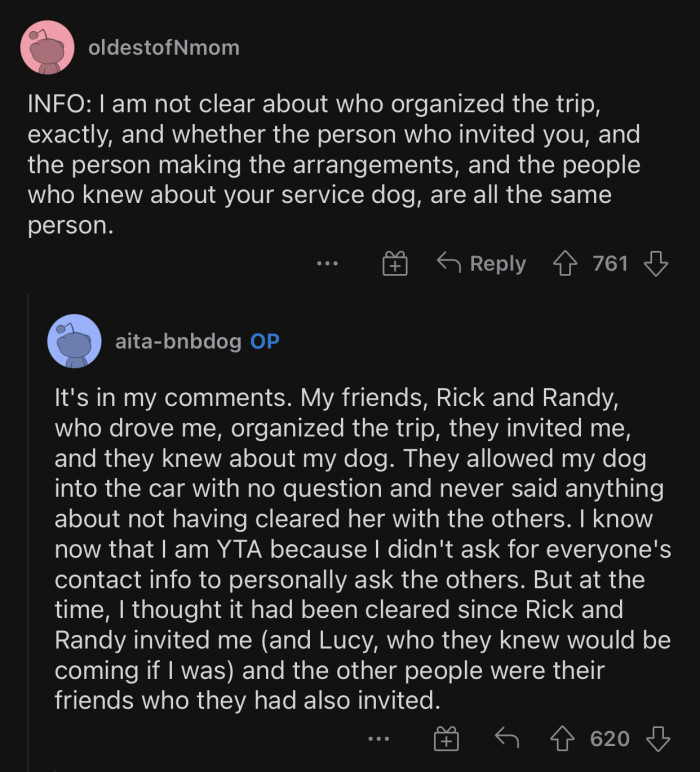
You have to see it from different perspectives.
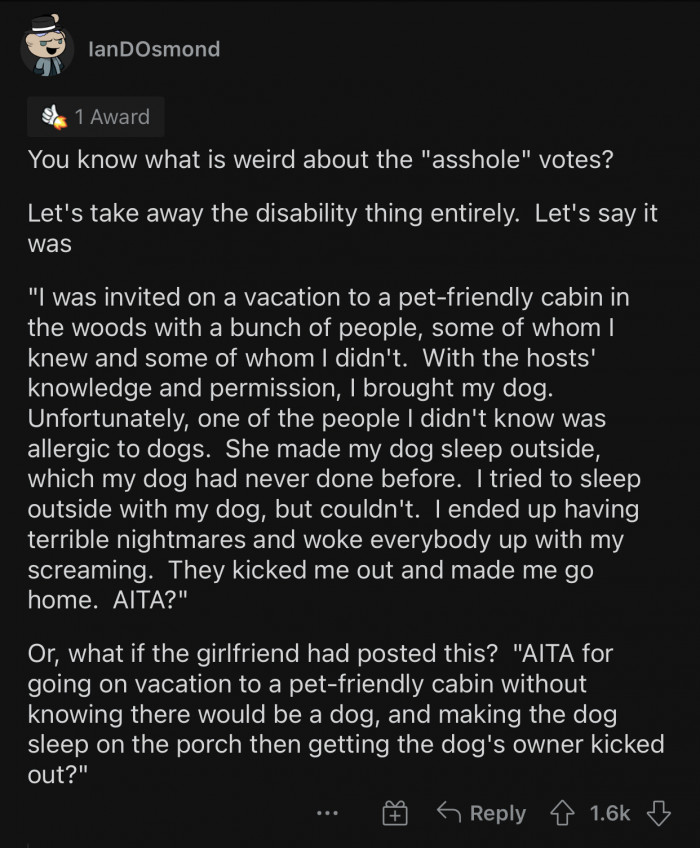
Interpersonal relationships play a crucial role in the recovery process for individuals with complex PTSD. A clinical psychologist emphasizes that the quality of these relationships can either facilitate healing or contribute to ongoing trauma symptoms. Studies show that supportive friendships can lead to better mental health outcomes, while toxic friendships can lead to increased feelings of anxiety and depression.
Therefore, it’s vital for individuals to cultivate relationships that empower rather than diminish them. Engaging in self-reflective practices, such as journaling or therapy, can help individuals identify healthy versus unhealthy relational patterns, thus enhancing their emotional well-being.
Friends are supposed to care for and help each other. The way OP's supposed friends handled the situation proves they do not value the friendship they have.
OP suffers from a severe condition and needs to surround themselves with caring people who will comfort them whenever they are down or sick. That's the least you could expect from friends; otherwise, what's the point of forming friendships in the first place?
Psychological Analysis
This situation highlights a troubling aspect of social dynamics: the tendency to ostracize individuals who are different or who require additional support due to their mental health struggles. The friends' decision to vote out someone needing an emotional support dog suggests a lack of empathy and an unwillingness to accommodate someone’s needs, which can be particularly damaging for someone with complex PTSD. Ultimately, this underscores the importance of surrounding ourselves with supportive individuals who understand and respect our emotional journeys—healthy friendships are vital for healing and resilience.
Analysis generated by AI
Overall, understanding the interplay between trauma, social dynamics, and individual psychological responses is essential for fostering healthier relationships. Behavioral specialists note that supportive environments can significantly mitigate the adverse effects of social exclusion, especially for individuals with complex PTSD. Implementing practical strategies, such as open communication and empathy-building activities, can help create a culture of support and understanding. Ultimately, healing is a journey best navigated together, where friends can learn to cultivate resilience, compassion, and mutual respect.



